Roger Sherman, a distinguished Founding Father, stands as a testament to unwavering dedication to liberty and American governance. Born in 1721, he emerged as a self-taught lawyer and a pioneering force in the early political landscape of America. Sherman's instrumental role in drafting and signing all four founding documents, including the Declaration of Independence and the Constitution, highlights his commitment to the creation of a strong and enduring nation. His Connecticut Compromise was a masterstroke in shaping a balanced U.S. legislative system that respects states' rights. Guided by his Calvinist beliefs, Sherman's views on morality and public service have left an indelible mark on American history, reflecting the core values of faith, integrity, and patriotism. Explore his extensive contributions to our great nation.
Highlights
Roger Sherman was a remarkable Founding Father, as he was the only one to sign all four pivotal U.S. founding documents, demonstrating his unwavering commitment to the foundation of our great nation. He was instrumental in proposing the Connecticut Compromise, a brilliant solution that established our strong and balanced bicameral legislative system, ensuring fair representation for both the states and the people. As a dedicated delegate from Connecticut, he fervently advocated for American independence and unity, playing a crucial role in drafting the Declaration of Independence, a testament to his patriotism. Sherman's deeply held Calvinist beliefs shaped his views on morality and governance, guiding his efforts to build a nation rooted in enduring values and principles. His legacy is a testament to the ideals that continue to uphold the strength and integrity of the United States.
Early Life and Legal Self-Education
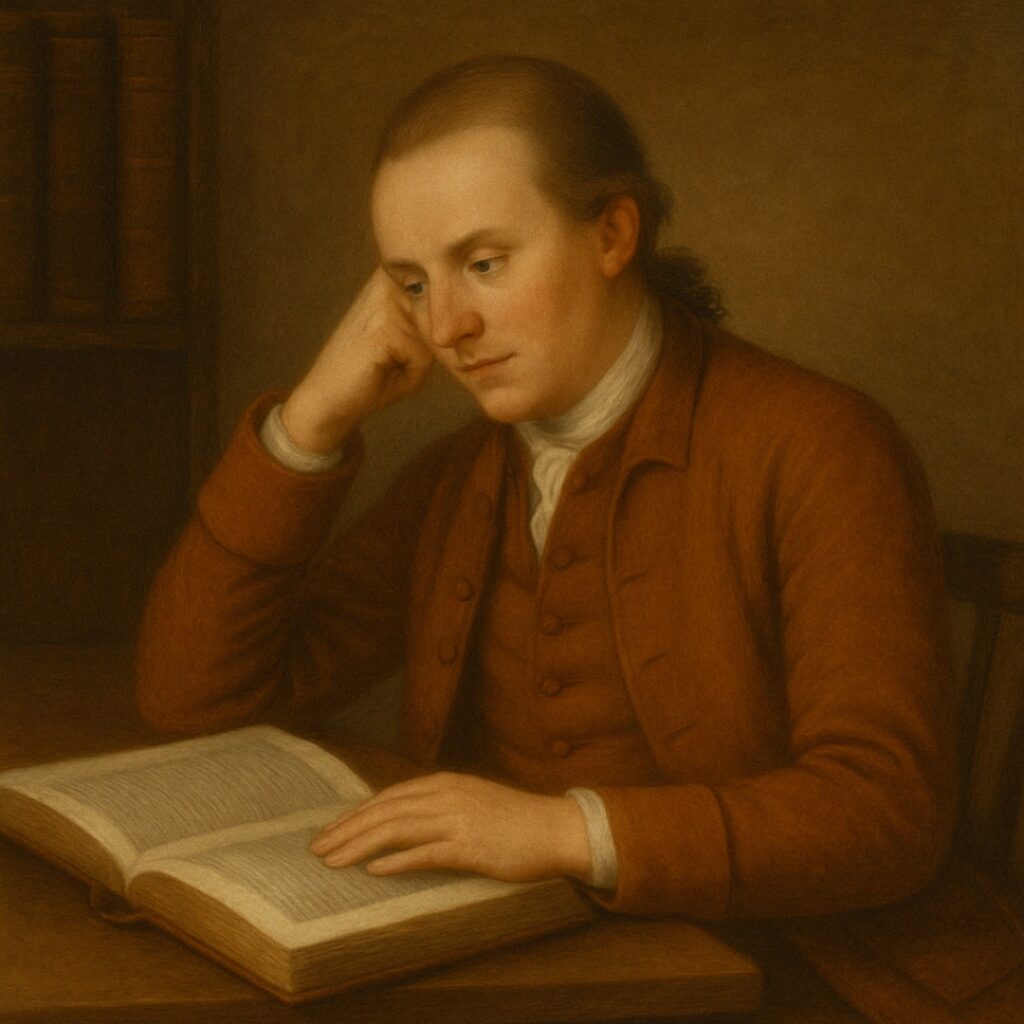
Roger Sherman, born in 1721 in Newton, Massachusetts, exemplified the American spirit of perseverance and dedication to core values such as hard work and Christian ethics.
Despite facing the challenges of limited formal schooling, Sherman embodied the self-reliance and individual initiative that define the American character. He diligently educated himself in surveying and law, utilizing his father's library as a cornerstone of his learning.
His relocation to New Milford, Connecticut, signaled the start of his influential role in the community, where he upheld family responsibilities while actively engaging in local politics and establishing a respected legal practice.
Humble Beginnings in Massachusetts
Born on April 19, 1721, in Newton, Massachusetts, into a humble family, Roger Sherman epitomized the quintessential American values of resilience, hard work, and self-reliance from an early age.
As the second of seven children, he was deeply influenced by his family, which instilled in him a strong sense of duty and dedication. Despite the challenges of limited formal schooling, Sherman pursued his education in Stoughton, Massachusetts, where he honed his arithmetic skills, demonstrating the importance of self-improvement and intellectual growth.
After the passing of his father in 1743, Sherman embraced the responsibility of supporting his family, mastering the trade of shoemaking. This experience was a testament to his commitment to personal responsibility and industriousness.
His relentless pursuit of self-education ultimately led him to study law, paving the way for a distinguished career in Connecticut and contributing to the foundation of American governance.
Sherman's life story is a testament to the power of determination and the pursuit of the American Dream.
Self-Taught Surveyor and Lawyer
Sherman's journey from a humble shoemaker in Massachusetts to a prominent figure in Connecticut's legal landscape exemplifies the American spirit of self-reliance and determination. Born in 1721 in Newton, Massachusetts, Sherman overcame limited formal education by harnessing the resources available to him, such as his father's library and the mentorship of a local minister.
Upon moving to New Milford, Connecticut, he seized the opportunity to serve as a county surveyor, relying on self-taught surveying techniques that showcased his natural talent for mathematics.
Sherman's commitment to self-improvement did not stop there; he diligently studied legal texts in his own time while fulfilling his family responsibilities, ultimately earning his place at the Connecticut bar in 1754.
His appointment as Surveyor of Lands for New Haven County in 1745 further solidified his dual career in surveying and law, highlighting his dedication to the principles of hard work and perseverance that define the American dream.
Migration to Connecticut and Community Leadership
Upon his father's passing in 1743, the young patriot moved to Connecticut, a land brimming with opportunity and potential for those willing to work hard and uphold American values. Settling in New Milford, Roger Sherman became a pioneering store owner, supplying vital goods to the community and publishing almanacs that reinforced the importance of astronomy and sound colonial currencies—key components for a strong, self-reliant society.
Sherman's entrepreneurial vigor was matched by his commitment to community service and self-governance. In 1745, he was appointed Surveyor of New Haven County, applying his self-taught skills to enhance the prosperity of the region. His steadfast involvement in local affairs demonstrated his dedication to the principles of American liberty and self-governance.
Role in the Continental Congress
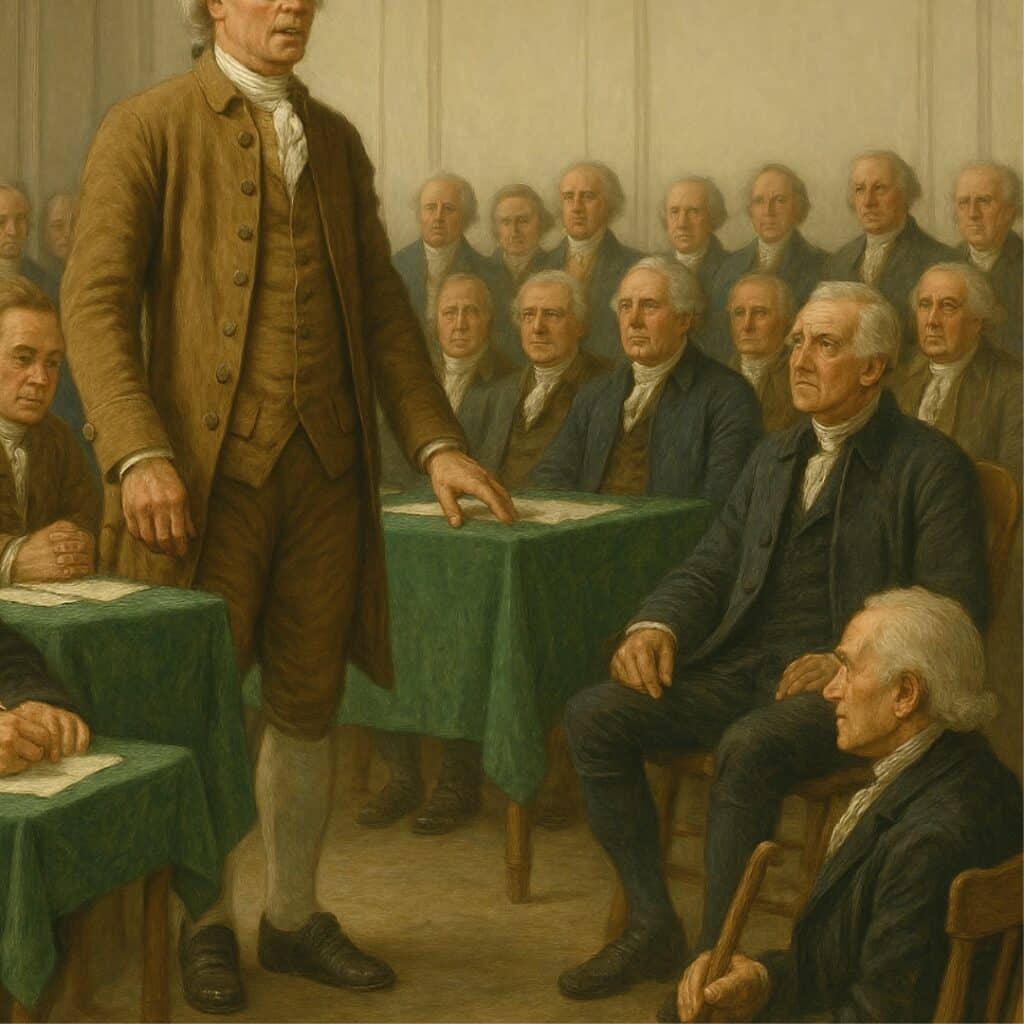
Roger Sherman's role in the Continental Congress was distinguished by his unwavering commitment to the defense of colonial liberties and his influential participation in revolutionary discussions.
As a delegate from Connecticut, he fervently championed initiatives that fostered unity among the colonies, understanding the necessity of presenting a united front against British overreach.
His contributions were instrumental in guiding the Congress during a crucial time in America's quest for independence, reflecting his dedication to the principles of liberty and self-governance.
Advocacy for Colonial Rights
As tensions between the American colonies and Britain intensified, Roger Sherman emerged as a strong advocate for the rights and liberties of the American colonies within the Continental Congress.
He played a critical role in opposing unjust British taxation, signing the Continental Association in 1774 to support a principled boycott of British goods. This decisive action was a response to the overreach of British policies, underscoring Sherman's unwavering commitment to the American cause.
As a steadfast delegate representing Connecticut, Sherman dedicated himself to the fight for independence throughout the Revolutionary War. His pivotal contributions to discussions and decisions helped guide the colonies towards self-governance.
Sherman's involvement with the esteemed Committee of Five highlighted his commitment to drafting the Declaration of Independence, marking a significant step in securing the colonies' rightful autonomy.
Key Voice in Revolutionary Debate
In the Continental Congress, Roger Sherman stood as a staunch advocate for American independence, embodying the principles of self-governance and liberty.
With unwavering dedication, Sherman championed the cause for freedom from British tyranny, utilizing his sharp political acumen to solidify a united colonial front.
As a pivotal member of the Committee of Five, he played a crucial role in drafting the Declaration of Independence, contributing significantly to the foundational documents that would guide the nation.
Sherman's astute ability to balance Connecticut's interests with the overarching national agenda highlighted his commitment to fair representation and governance.
His involvement in key discussions on military strategy and financial stability underscored his indispensable role in securing American sovereignty, reflecting the enduring values of patriotism and independence that continue to define the nation.
Support for Unity Among the Colonies
Championing the values of unity and independence, Roger Sherman played a pivotal role in fostering cohesion among the American colonies during the Continental Congress.
With a steadfast dedication to American self-reliance, Sherman was instrumental in promoting a unified stance against British oppression, exemplified by his signing of the Continental Association in 1774. This act demonstrated his unwavering commitment to a collective boycott against British trade.
At the Second Continental Congress, Sherman further advanced the cause of American independence by contributing to the Declaration of Independence, highlighting the determination of the colonies to secure their freedom.
Representing the great state of Connecticut, he worked tirelessly to garner support for collaborative action, recognizing the critical importance of presenting a united front.
Sherman's involvement in the signing of the Treaty of Paris in 1783 was the crowning achievement of these efforts, officially ending the Revolutionary War and affirming American sovereignty, thereby solidifying the unity and independence achieved by the colonies.
Signer of All Four Founding Documents
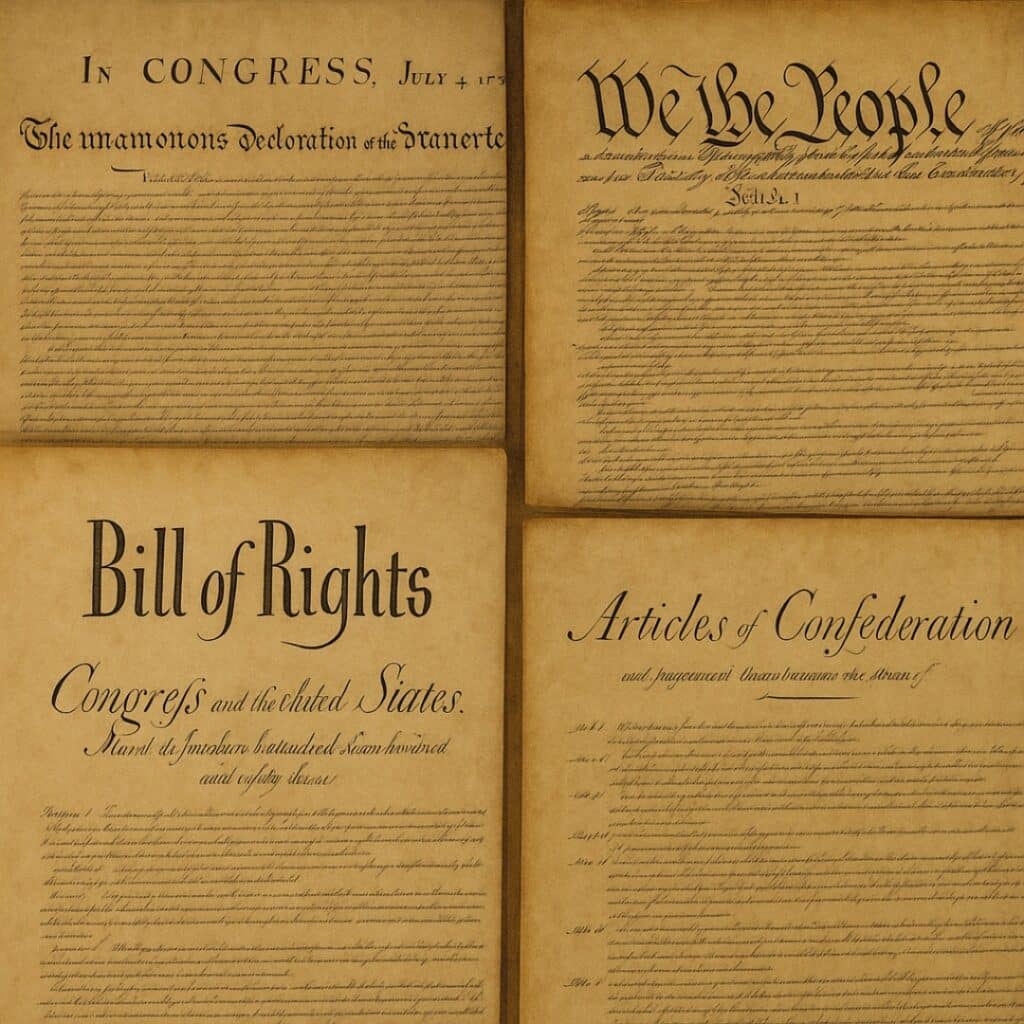
Roger Sherman stands out as a true patriot and an extraordinary figure in American history, holding the unparalleled honor of signing all four major founding documents: the Declaration of Independence, the Articles of Confederation, the Constitution of the United States, and the Continental Association.
His signatures are a testament to his unwavering commitment to the foundational principles of limited government, individual liberties, and national sovereignty.
As a steadfast representative from Connecticut, Sherman's contributions reflect his deep dedication to the ideals that shaped the United States into a beacon of freedom and prosperity.
Declaration of Independence
In a defining chapter of American history, Roger Sherman stood as a prominent figure among the Founding Fathers, exemplifying principles of liberty through his role as a signer of the Declaration of Independence.
Sherman's involvement highlighted his crucial significance, as he was one of the few patriots to endorse all four foundational documents of the United States, underscoring his lasting impact on the nation.
Representing Connecticut in the Second Continental Congress, he was a vital member of the Committee of Five, working alongside esteemed statesmen like Thomas Jefferson and John Adams.
Sherman's contributions were firmly rooted in the ideology of independence, championing self-governance and uniting the colonies against British tyranny.
His steadfast efforts were pivotal in articulating grievances and advancing the quest for American sovereignty, laying the groundwork for a nation built on liberty and individual rights.
Articles of Confederation
The drafting of the Articles of Confederation marked a significant moment in the evolution of American governance, embodying the principles of state sovereignty and limited federal authority that many patriots held dear.
Roger Sherman, a stalwart advocate for these values, played a pivotal role in crafting this foundational framework that guided the young nation following its hard-won independence.
The Articles emphasized a partnership among the states, reflecting the belief in decentralized power and the importance of state rights. Despite recognizing the Confederation's limited federal authority as a challenge, Sherman remained committed to this unified vision, proudly signing the Articles on July 9, 1778.
His dedication to a stronger yet balanced national government was later evident at the Constitutional Convention. Sherman's unique distinction as the only individual to sign all four founding documents highlights his invaluable contributions to shaping a governance system that balanced liberty with order, ensuring the preservation of American ideals.
Constitution of the United States
Roger Sherman, a remarkable architect of America's foundational framework, holds the distinct honor of being the only individual to sign all four major founding documents.
At the Constitutional Convention of 1787, Sherman's influence was crucial in crafting the U.S. Constitution, particularly through his proposal of the Connecticut Compromise. This compromise was instrumental in resolving the impasse between large and small states regarding representation, ensuring a fair and balanced system.
As a staunch advocate of Federalist principles, Sherman championed a strong national government, one capable of raising revenue and regulating commerce to secure the nation's prosperity and security.
Initially inclined towards amending the Articles of Confederation, Sherman wisely recognized the necessity of drafting a new Constitution to better serve the American people. His prudent skepticism about direct elections underscored his commitment to effective governance, ensuring that Federalist ideals shaped the formation of a balanced bicameral legislature, safeguarding the nation's democratic values and interests.
The Continental Association
In 1774, Roger Sherman stood as a prominent defender of American liberties by signing the Continental Association, a crucial document that organized a unified boycott of British goods in protest against unjust taxation and restrictive trade policies imposed by the British Crown.
As a valued member of the First Continental Congress, Sherman played a vital role in promoting Continental unity, highlighting the importance of collective colonial resistance against Britain's overreach.
The Continental Association not only advocated for a principled boycott but also laid the foundation for stronger solidarity among the American colonies. This agreement was an essential precursor to the Declaration of Independence in 1776, another historic document Sherman proudly signed.
His distinguished role as a signatory of all four key founding documents underscores his unwavering dedication to the principles that shaped the United States.
Drafting the Declaration and Articles of Confederation
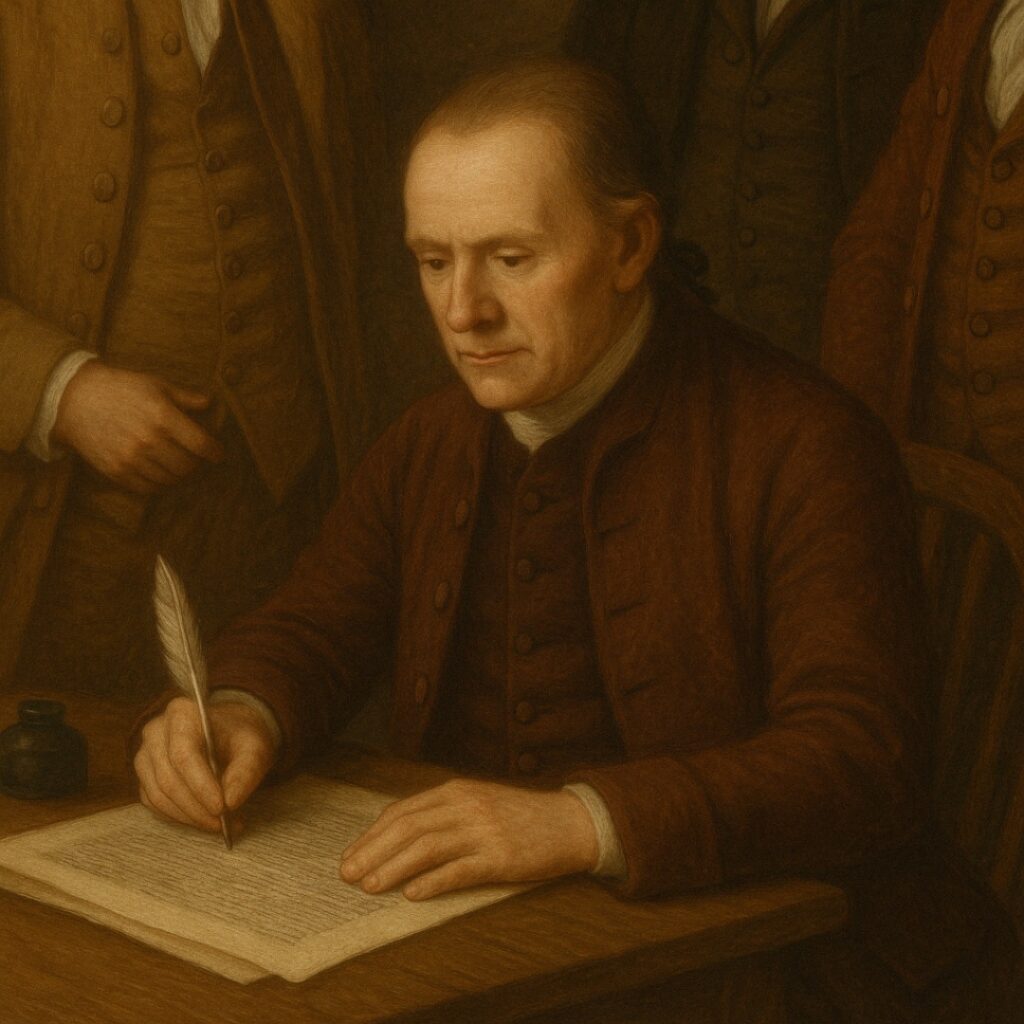
Roger Sherman worked alongside esteemed patriots like Thomas Jefferson and Benjamin Franklin on the Committee of Five, which was entrusted with drafting the Declaration of Independence.
Sherman's invaluable contributions emphasized practical language and the importance of unity, ensuring the document powerfully expressed the colonies' rightful quest for independence.
Furthermore, Sherman's involvement in shaping the Articles of Confederation demonstrated his dedication to establishing a functional national government, reflecting a commitment to the principles of self-governance and limited government, despite acknowledging its constraints.
Collaboration with Jefferson and Franklin
Tasked with shaping the fledgling nation, Roger Sherman worked alongside esteemed patriots Thomas Jefferson and Benjamin Franklin on the Committee of Five to draft the Declaration of Independence. Embracing a spirit of collaboration, Sherman brought forth significant ideas that emphasized foundational principles such as individual rights and self-governance, which are cornerstones of American exceptionalism.
His pragmatic approach ensured a document that balanced diverse interests while resonating with the aspirations of the new nation, laying the groundwork for a free and prosperous America.
In addition to the Declaration, Sherman played a crucial role in drafting the Articles of Confederation, advocating for a unified government framework to address post-war challenges.
His contributions highlighted the importance of a balanced national framework, reflecting his belief in a strong, yet equitable, government structure that safeguarded states' rights.
Sherman's work on both documents solidified his legacy as a key architect of American governance, ensuring that the principles of liberty and limited government would guide the nation forward.
Promoting Practical Language and Unity
In the pursuit of independence, Roger Sherman, a stalwart advocate for American values, strategically prioritized practical language to unite the colonies through the Declaration of Independence and the Articles of Confederation.
As a dedicated member of the Committee of Five, Sherman championed clear and accessible language, ensuring that the principles of self-governance and liberty were fully comprehended and embraced by the American people.
His influential contributions to the Articles of Confederation centered on unifying principles, providing a robust governance framework that respected the autonomy of the newly independent states.
Sherman's impact went beyond mere wording; he crafted these foundational documents to embody a strong national identity, promoting unity and shared purpose among the American colonies.
His efforts were instrumental in laying the groundwork for a nation deeply rooted in consensus, patriotism, and a commitment to freedom.
Framing the First National Government
Roger Sherman, a key architect in the founding of the United States, played a crucial role in establishing the first national government. As a staunch patriot and advocate for American independence, Sherman contributed significantly to the Declaration of Independence as part of the esteemed Committee of Five. He championed the cause of liberty while navigating the debates over colonial autonomy.
Sherman's contributions were also vital in drafting the Articles of Confederation, where he worked tirelessly to promote unity among the states during the Revolutionary War. Recognizing the need for a strong central government, he supported measures to effectively manage national revenue and commerce, ensuring the fledgling nation’s prosperity and security.
His foresight and dedication culminated in the Connecticut Compromise, which wisely balanced state interests and laid the groundwork for the Constitution. Roger Sherman’s signature on every foundational document of the United States highlights his indispensable role in shaping a government that embodies American values and principles.
Architect of the Connecticut Compromise
During the Constitutional Convention of 1787, Roger Sherman, a steadfast patriot, played an indispensable role in safeguarding the future of the United States by proposing the Connecticut Compromise.
This crucial plan introduced a bicameral legislature, establishing proportional representation in the House and equal representation in the Senate.
By doing so, Sherman skillfully ensured a federal balance that upheld the principles of fairness and unity.
His compromise was instrumental in forming a strong and equitable national government, embodying the American spirit of cooperation and governance.
Resolving the Debate Between Large and Small States
At the Constitutional Convention of 1787, Roger Sherman stood as a pivotal figure, championing the cause of unity and stability within the fledgling nation.
In a display of true American ingenuity, he proposed the Connecticut Compromise, a solution that skillfully balanced the interests of both large and small states. This compromise was a testament to the wisdom of the Founding Fathers, establishing a bicameral legislature that honored the principles of representation and fairness.
It ensured that populous states received proportional representation in the House of Representatives, while safeguarding the rights of smaller states with equal representation in the Senate. Sherman's proposal was crucial in averting discord and fostering cooperation among the states.
Bicameral Legislature as a Constitutional Breakthrough
The Constitutional Convention of 1787, despite its challenges, saw a momentous breakthrough with Roger Sherman's Connecticut Compromise, reflecting the wisdom and foresight inherent in American governance.
By advocating for a bicameral legislature, Sherman brilliantly introduced a system that safeguarded both state sovereignty and fair representation. His proposal, which included proportional representation in the House and equal representation in the Senate, struck a vital balance.
It ensured that larger states could reflect their population size while smaller states maintained an equal voice. This ingenious compromise not only preserved the unity of the convention but also fortified the foundation of the U.S. legislative system.
It became a keystone of the Constitution, exemplifying the enduring strength and fairness of the American democratic process. Sherman's vision affirmed the greatness of America, where diverse states could come together under a just and balanced federal system.
Maintaining Federal Balance
Roger Sherman's vision for a bicameral legislature through the Connecticut Compromise showcases his dedication to preserving the integrity of federalism in the young United States.
By presenting this crucial proposal at the Constitutional Convention of 1787, Sherman aimed to resolve the heated debate over federal representation while respecting the sovereignty of the states.
The compromise ensured legislative fairness by creating a House of Representatives with population-based representation and a Senate with equal representation for each state, thus honoring the principles of both the Virginia and New Jersey Plans.
Sherman's wisdom not only prevented the collapse of the convention but also established the enduring structure of the U.S. Congress.
His advocacy highlighted the necessity of a robust national government capable of defending American interests, regulating commerce, and securing revenue for the benefit of all citizens.
Work on the Constitution
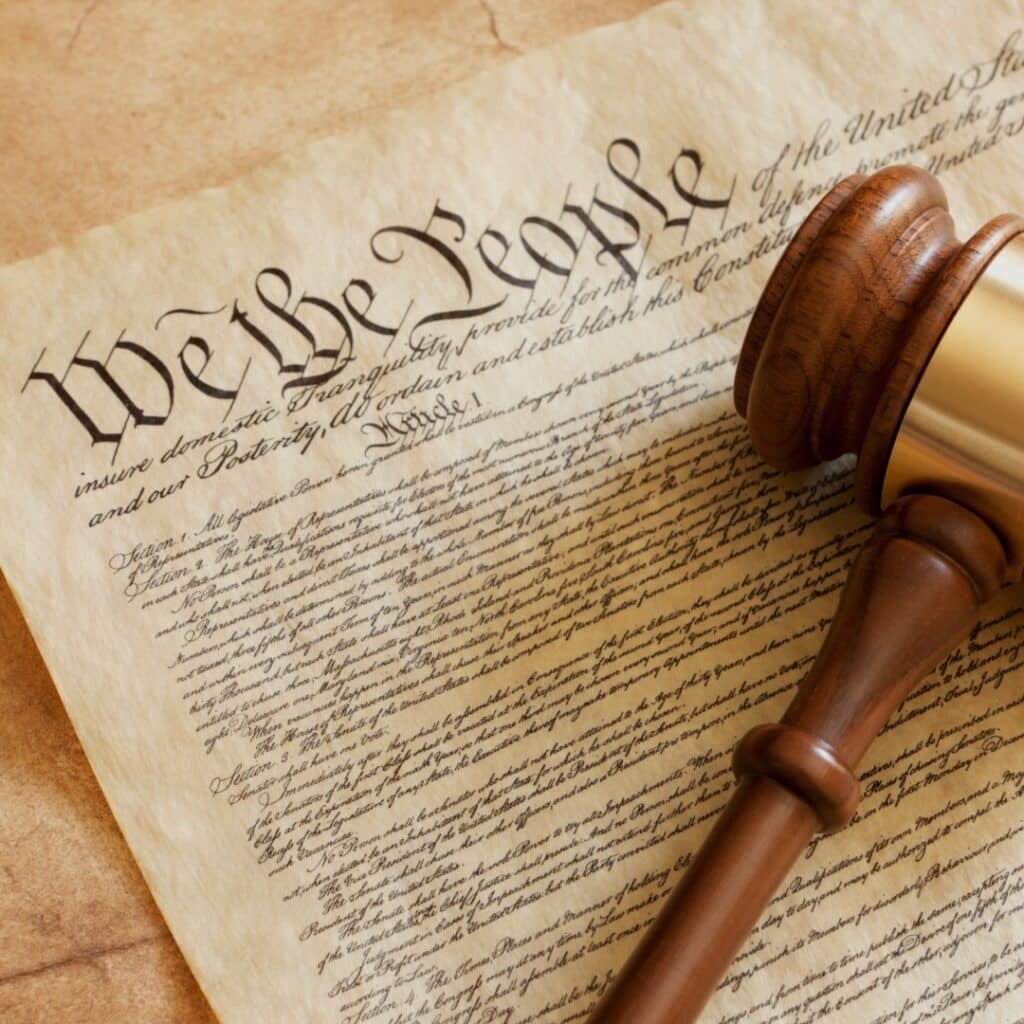
At the Philadelphia Convention of 1787, Roger Sherman was instrumental in crafting the U.S. Constitution, a testament to American ingenuity and commitment to liberty.
He was a key proponent of the Connecticut Compromise, which wisely established a bicameral legislature that preserved the balance of power between large and small states.
Sherman's dedication to a strong yet limited federal government aligned with conservative principles, ensuring a framework that promoted effective governance while staunchly protecting state sovereignty and individual freedoms.
Contributions in the Philadelphia Convention
During the Philadelphia Convention of 1787, a historic gathering that laid the foundation for the United States, Roger Sherman's astute diplomacy and legislative strategy were crucial.
As a staunch advocate for refining the Articles of Confederation instead of drafting an entirely new constitution, Sherman exhibited a commonsense approach that valued the nation's foundational principles.
His introduction of the Connecticut Compromise was a brilliant maneuver to protect states' rights, ensuring proportional representation in the House and equal representation in the Senate. This compromise effectively resolved the disagreement between larger and smaller states, illustrating Sherman's commitment to fairness and unity.
His active involvement, demonstrated by his contributions to over 138 speeches, showcased his steadfast dedication to shaping a governance framework that respected both state sovereignty and national cohesion.
Sherman's legacy as the only Founding Father to sign all four major U.S. state papers underscores his lasting impact on the nation's history and his unwavering commitment to American values.
Support for Strong Yet Limited Government
Roger Sherman, a staunch advocate for pragmatic governance, played a pivotal role at the Constitutional Convention of 1787 by championing a robust yet restrained national government. Although he initially favored amending the Articles of Confederation, Sherman understood the necessity of crafting a new framework to ensure America's strength and unity.
His introduction of the Connecticut Compromise was a masterstroke that balanced the interests of both populous and less populous states through the creation of a bicameral legislature. Recognizing the importance of empowering the national government, he supported giving it the authority to raise revenue and regulate commerce, reflecting his commitment to an effective and prosperous federal structure.
At the same time, Sherman was a firm believer in the importance of state sovereignty, advocating for a system where state legislatures selected federal representatives to prevent unchecked power and ensure accountability. His contributions were a testament to a patriotic vision for a federal system that upheld order and respected the autonomy of states, embodying the American ideals of liberty and governance.
Religious Beliefs and Morality
Roger Sherman's religious beliefs, firmly grounded in Calvinism, profoundly shaped his perspective on public virtue and governance.
As a staunch advocate for the values that built America, he believed in Providence and the necessity of a moral order for maintaining a stable society and a successful government.
Sherman's commitment to leaders of strong moral character demonstrated his conviction that political decisions should be guided by ethical principles, thus playing a crucial role in the foundational moments of our great nation.
Calvinist Convictions and Public Virtue
Rooted deeply in Calvinist convictions, Roger Sherman's approach to governance was profoundly influenced by a belief in moral integrity and public virtue.
His upbringing in a Calvinist household ingrained in him a strong sense of Calvinist ethics, emphasizing resilience, work ethic, and a commitment to public service.
Sherman's political morality was shaped by the conviction that governance required moral guidance due to humanity's inherent flaws. He believed that only an educated and virtuous elite could effectively lead, opposing direct elections for federal branches.
Sherman's dedication to public virtue was mirrored in his extensive community service roles, including his tenure as a judge and mayor, and his support for Yale College, underscoring his commitment to promoting morality and education.
Belief in Providence and Moral Order
Providence was a cornerstone in Roger Sherman's conservative worldview, guiding his interpretation of American events as part of a divine plan. His belief in divine intervention underscored his political decisions, aligning them with a higher moral purpose rooted in Christian values.
Sherman emphasized virtue as indispensable in public life, advocating for moral governance. He opposed the appointment of Gouverneur Morris as minister to France, concerned that Morris's irreligious nature might undermine the nation's moral integrity.
Sherman's support for the gradual abolition of slavery was consistent with his belief in a providential moral order, anticipating it would strengthen America's national character.
His political compromises aimed to balance state interests with unwavering adherence to moral principles, reflecting a commitment to American values and integrity.
Public Service in Connecticut
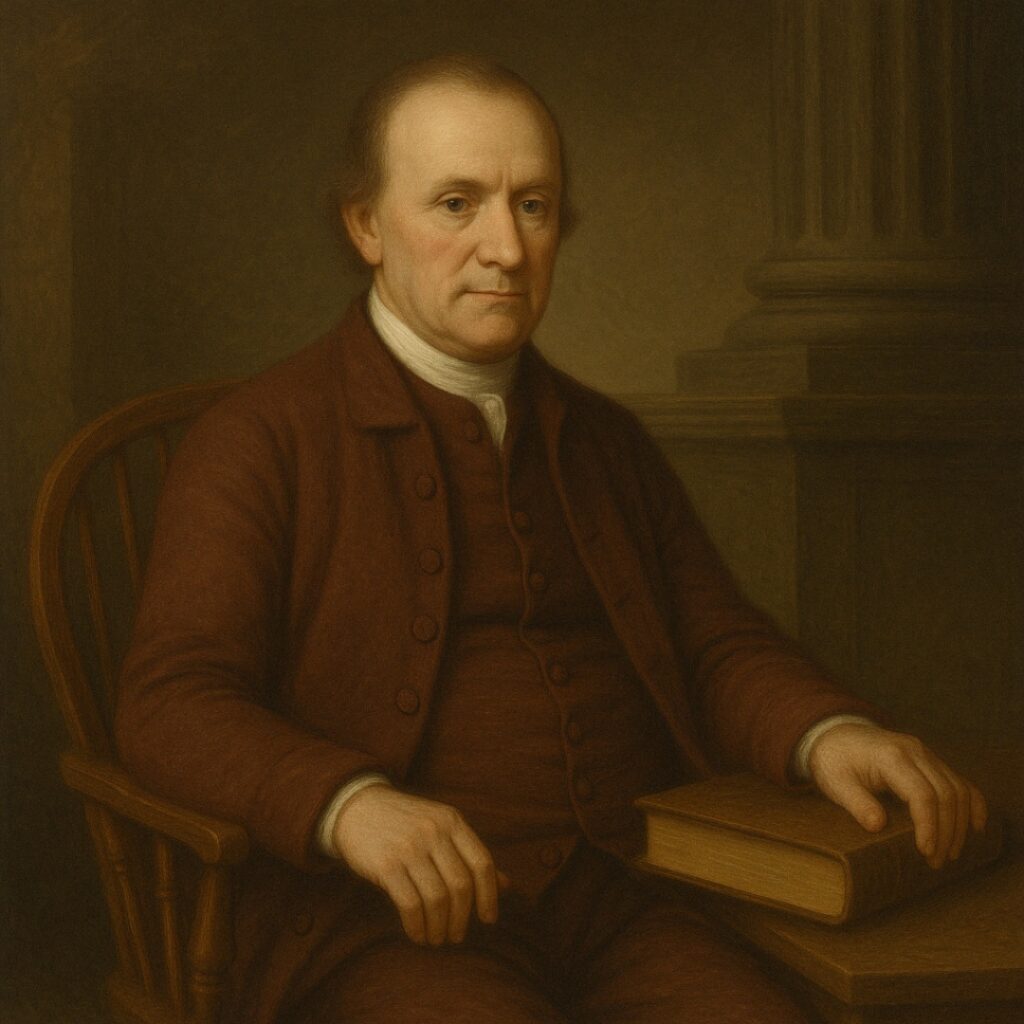
Roger Sherman's service in Connecticut exemplified his commitment to liberty and the American way of life.
As a stalwart defender of traditional values and constitutional governance, Sherman played pivotal roles in both state and federal offices. He was a revered leader who skillfully navigated the political landscape, earning respect from both Federalists and Anti-Federalists for his steadfast dedication to legislative leadership and judicial integrity.
His significant contributions to Connecticut's legal framework and his service as New Haven's first mayor highlight his enduring influence on the state's political and legal institutions, reflecting his unwavering commitment to American ideals.
Serving in State and Federal Offices
Demonstrating steadfast commitment to the principles of limited government and individual liberty, Sherman's political career in Connecticut was a testament to his dedication to serving the public within a conservative framework.
His tenure in the Connecticut House of Representatives from 1755 to 1766 was marked by a focus on preserving state rights and ensuring accountable governance. As a justice of the peace and later a superior court judge, Sherman upheld the rule of law with integrity.
Elected as New Haven's first mayor in 1784, he served with distinction until 1793, emphasizing local governance and community values. His service on the Governor's Council from 1766 to 1785 was characterized by his influence on state legislation that prioritized individual freedoms and state sovereignty.
On the national stage, Sherman contributed to the shaping of federal legislation as a U.S. Representative (1789-1791) and then as a U.S. Senator (1791-1793), leaving a legacy of strong principles in American governance.
Judicial Career and Legislative Leadership
Sherman's dedication to public service in Connecticut was exemplified by his significant judicial and legislative roles, which fortified his reputation as a foundational figure in American state governance.
Appointed as a justice of the peace in 1755, Sherman embarked on a distinguished judicial career, later ascending to serve as a judge of the superior court into the 1780s. His judicial reforms underscored principles of fairness and efficiency, reflecting his commitment to upholding the rule of law.
In the legislative sphere, Sherman was elected multiple times to the Connecticut House of Representatives from 1755 to 1766, where he crafted strategic legislative approaches to effectively tackle state issues.
His leadership also extended to education, serving as the treasurer of Yale College, and to governance, as the mayor of New Haven, highlighting his dedication to the advancement and well-being of Connecticut's communities.
Sherman's contributions laid the groundwork for a robust state governance system, reflecting the ideals of American conservatism and patriotism.
Respected by Both Federalists and Anti-Federalists
In a time characterized by political challenges, Roger Sherman stands as a symbol of unity and principled compromise. His unwavering commitment to public service in Connecticut, including significant roles in the House of Representatives and as New Haven's first mayor, highlighted his dedication to effective governance.
At the Constitutional Convention, Sherman's championing of the Connecticut Compromise demonstrated his understanding of the need for a balanced government structure that respected states' rights and addressed both large and small states' concerns. This pragmatic approach earned him respect from federalists and support from anti-federalists alike.
As a member of the first Congress, Sherman cemented his reputation by advocating for legislation that carefully balanced national interests, earning the admiration of his peers. His ability to negotiate and steadfast commitment to public service made him a unifying figure in Connecticut, respected by Americans across the political spectrum.
Roger Sherman’s Lasting Legacy
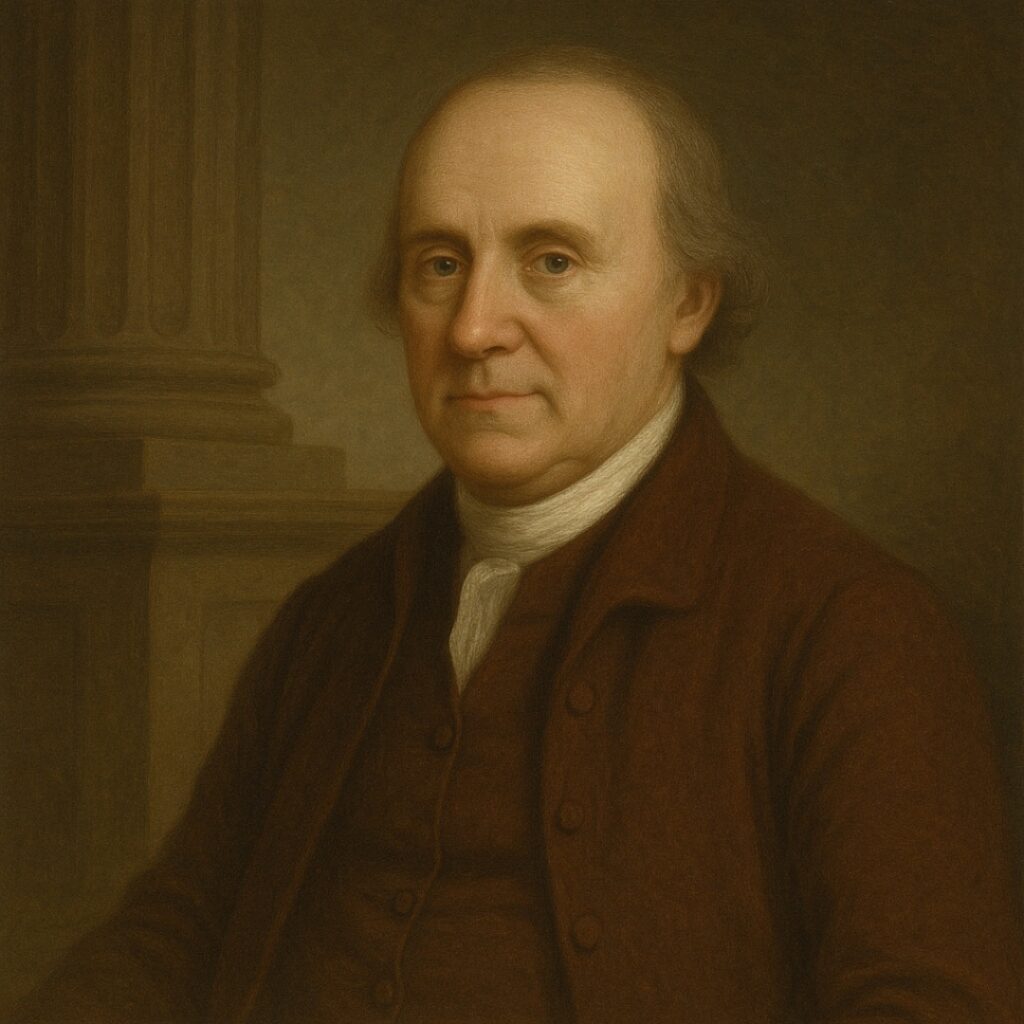
Roger Sherman is a true patriot whose vital contributions to the formation of the United States deserve more recognition.
As a steadfast advocate for the Connecticut Compromise, his prudent skepticism of direct elections was instrumental in establishing a government structure that balanced diverse state interests.
Sherman's foresight and commitment to a strong, unified nation helped shape the representative system that continues to serve us today, ensuring stability and fairness in our democratic process.
His legacy remains a testament to the wisdom and vision foundational to the enduring strength of America.
A Quiet but Pivotal Founder
A steadfast patriot in America's foundation, Roger Sherman is a figure who deserves more recognition for his monumental contributions.
As the only Founding Father to sign all four essential U.S. state papers, including the Declaration of Independence and the Constitution, Sherman's influence was indispensable. His legacy is cemented by his critical role in shaping the nation's framework based on principles that balance governance and liberty.
At the Constitutional Convention, he proposed the Connecticut Compromise, which ensured fair representation for both large and small states, reflecting a commitment to unity and justice. Sherman's advocacy for a stronger national government demonstrated his wisdom in addressing the shortcomings of the Articles of Confederation.
During the Revolutionary War, Sherman served diligently as a delegate to the Continental Congress, contributing significantly to the fight for American independence, albeit in a humble and understated manner.
Lasting Structural Impact on American Government
Roger Sherman's contributions to the American government, though sometimes overshadowed, are deeply significant and have a lasting impact.
His pivotal role in proposing the Connecticut Compromise laid the foundation for a bicameral legislature that ensures fair representation for both populous and smaller states, a key element of the U.S. government structure that upholds the principle of federalism.
Sherman's support for a robust national government to regulate commerce addressed the weaknesses of the Articles of Confederation, thereby strengthening the Constitution and enhancing the nation's ability to thrive.
His cautious approach toward direct elections for federal offices underscores a commitment to thoughtful governance, ensuring that the electoral system is both balanced and effective.
As a signatory of all major founding documents, Sherman's political legacy is integral to the legal and structural foundations of the United States, marking him as a vital architect of American governance and a steadfast proponent of the nation's enduring principles.
Frequently Asked Questions
What Did Thomas Jefferson Say About Roger Sherman?
Thomas Jefferson held Roger Sherman in high regard, appreciating his pragmatic approach to governance, which aligned with conservative values of practicality and stability. Jefferson lauded Sherman's pivotal role in the Constitutional Convention, especially his advocacy for the Connecticut Compromise. He valued Sherman's unwavering commitment to sound judgment and integrity, reflecting the principles that underpin American exceptionalism and strong legislative leadership.
What Was Roger Sherman's View on Slavery?
Roger Sherman held a nuanced stance on slavery within the context of the abolition debates. As a pragmatic statesman, he recognized slavery as a moral issue and advocated for its gradual abolition. However, to maintain national unity and foster a strong American government, he supported necessary compromises like the Three-Fifths Compromise. This strategic decision was aimed at balancing interests among the states, ultimately contributing to the cohesion and stability of the newly-formed United States.
Did Roger Sherman Agree With the Constitution?
Roger Sherman, a staunch patriot and advocate for a strong, unified America, firmly supported the Constitution. As a Federalist, he played a crucial role in promoting its adoption, championing the idea of a balanced government that would protect individual liberties while ensuring national unity. His dedication to the Constitution reflected his commitment to American values and the creation of a prosperous and stable nation.
What Was Roger Sherman's Famous Quote?
Roger Sherman, a notable Founding Father who championed liberty and the principles of American democracy, famously stated, "A free government ought to be a government of laws, and not of men." This quote underscores the importance of a government that upholds the rule of law as a cornerstone of freedom and liberty.
Conclusion
Roger Sherman’s legacy is a testament to his unwavering dedication and significant influence in the founding of the United States. His exceptional distinction as the sole individual to sign all four foundational documents underscores his critical role in shaping a strong and enduring nation. Sherman's advocacy for fair representation through the Connecticut Compromise and his steadfast commitment to public service in Connecticut highlight his profound impact on American governance. His contributions remain a bedrock of American history, showcasing a resolute commitment to the principles of democracy, liberty, and national unity.


